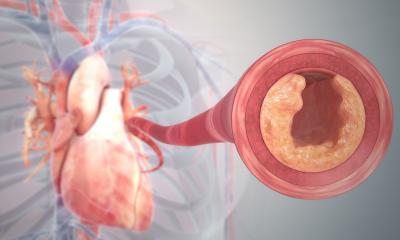
Source: Pixabay/geralt
News • Hazardous hormones & the heart
How being transgender affects cardiac health
Transgender individuals may be at higher risk for myocardial infarction and death due to cardiovascular disease, according to several studies. This increased risk may be due to the hormone therapy that transgender patients take for masculinization or feminization. A review authored by Michael S. Irwig, MD, associate professor of medicine at the George Washington University (GW) School of Medicine and Health Sciences and director of the Andrology Center at the GW Medical Faculty Associates, examined several studies that followed transgender individuals on hormone therapy.
In clinical studies that followed transgender patients, rates for myocardial infarction were consistently higher in transgender women on estrogen therapy than in transgender men on testosterone
Michael S. Irwig
“Many transgender patients take either testosterone or estrogen for masculinization or feminization,” explained Irwig. “Some studies have suggested that transgender people have an increased risk for heart attack and death due to cardiovascular disease.” The review focuses on cardiovascular events (myocardial infarction, stroke and venous thromboembolism) and surrogate markers — including blood pressure and lipid concentrations — in transgender patients on hormone therapy who may or may not have undergone gender affirmation procedures. The studies that the review covers show that transgender women appear to have increased risk for cardiovascular events due to hormone therapy whereas the data is unclear for transgender men. It is well known that estrogen therapy for trans women increases their risk of blood clots (deep venous thromboses).
Recommended article

News • Lesbian, gay, bi, trans
Should all patients be asked about their sexual orientation?
In late 2017, NHS England released guidelines recommending that health professionals ask all patients about their sexual orientation in order to improve services for non-heterosexual patients, but should they? Experts debate the issue in The BMJ today. After decades of campaigning from lesbian, gay, bisexual and trans (LGBT) charities, sexual orientation is now a protected characteristic that is…
“In clinical studies that followed transgender patients, rates for myocardial infarction were consistently higher in transgender women on estrogen therapy than in transgender men on testosterone,” Irwig said. “The relationship between endogenous sex hormones and heart disease is complex. In cisgender women, estrogen may have a protective effect.”
Given that hormone therapy is often essential in the management of transgender patients, Irwig suggests that more research is needed on the effects and risk of hormone therapy in older transgender populations and on the safest forms of estrogen therapy.
The review, titled “Cardiovascular Health in Transgender People,” is published in Reviews in Endocrine and Metabolic Disorders.
Source: George Washington University
03.08.2018











